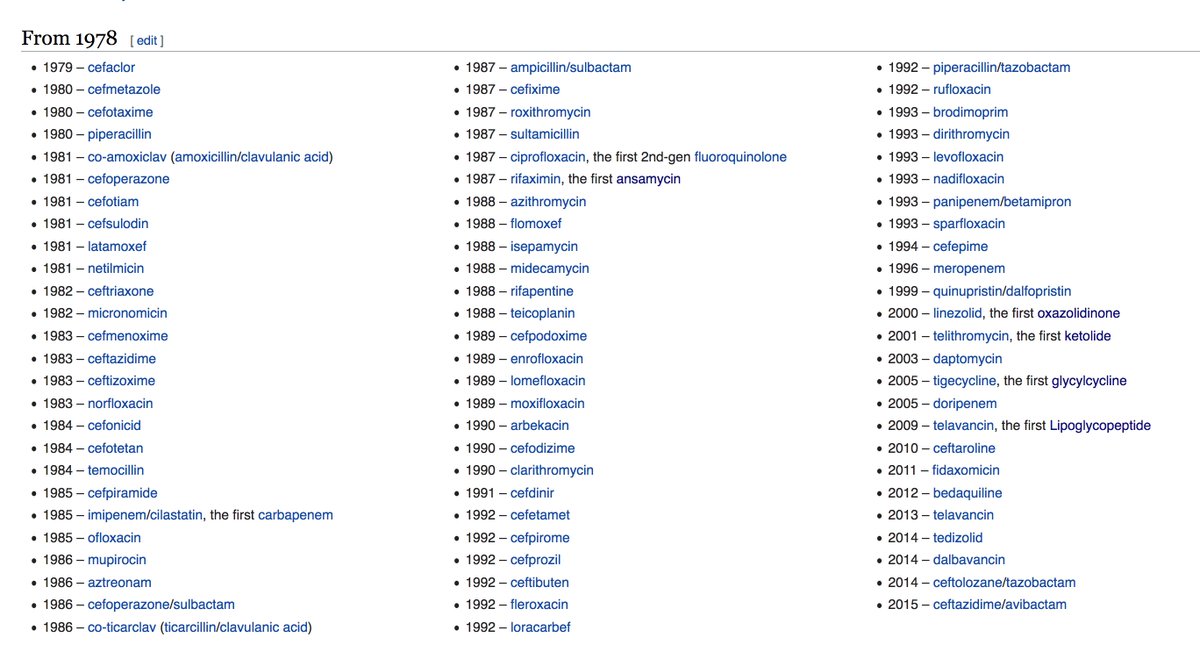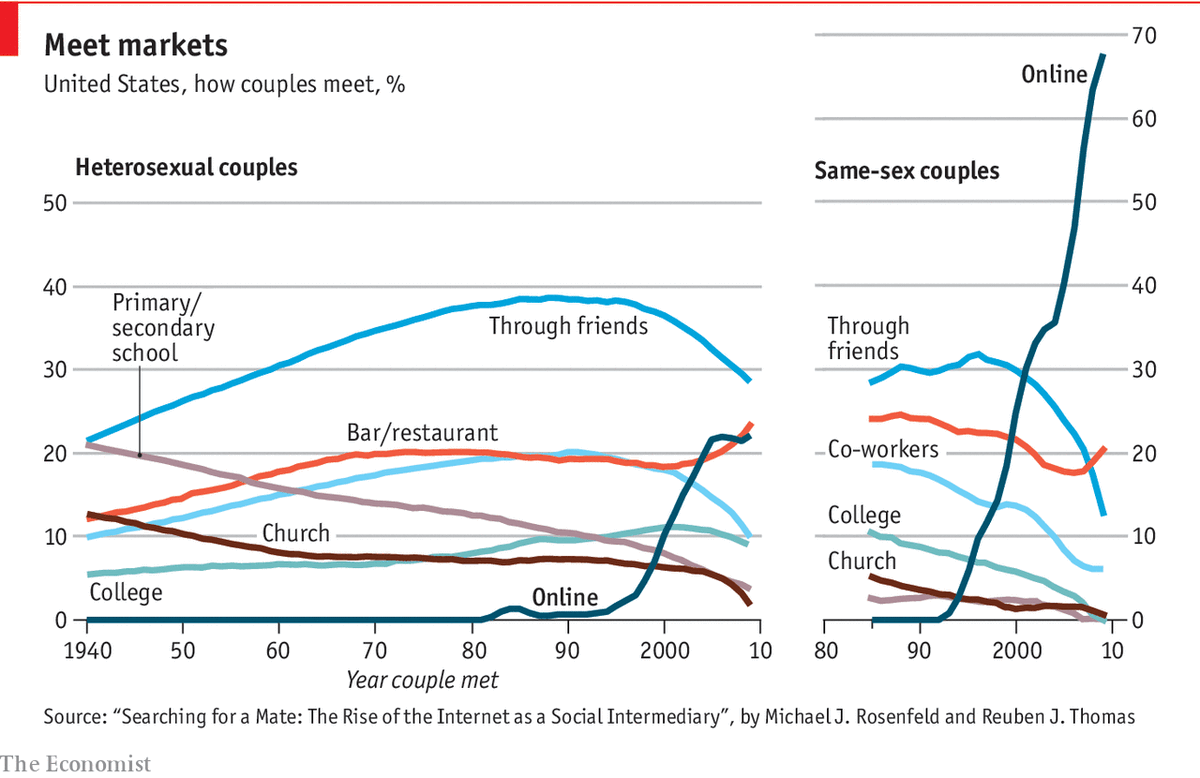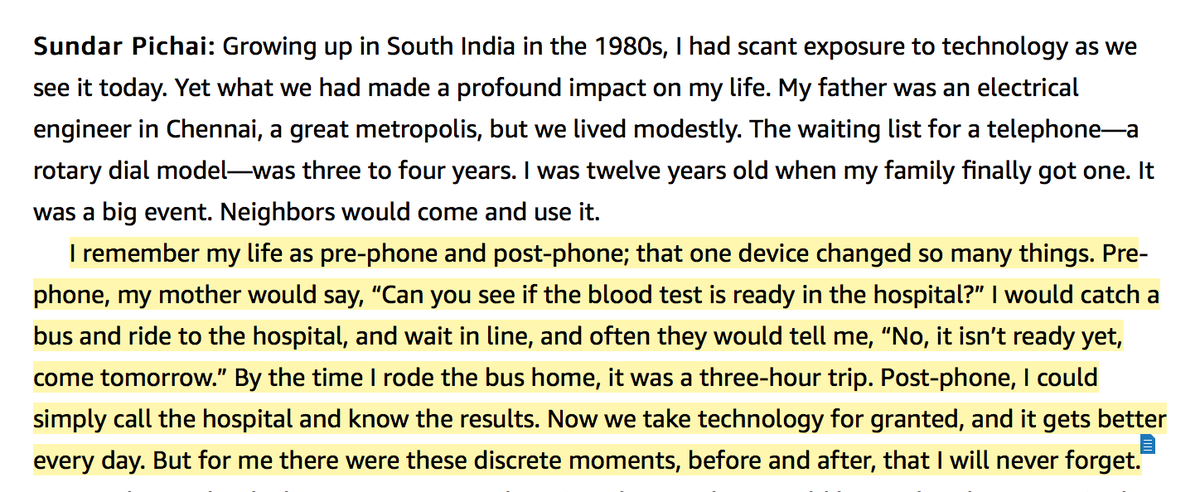Good lord. We have *so* much work to do. https://twitter.com/josephflaherty/status/1230972996061450241">https://twitter.com/josephfla...
This is an outright failure of our educational system.
A 47-year-old was born in ~1973.
Here are all the antibiotics discovered just since 1978, including five new families of antibiotics. Every one helps us combat resistance, avoid side effects, etc.
Here are all the antibiotics discovered just since 1978, including five new families of antibiotics. Every one helps us combat resistance, avoid side effects, etc.
Here are the vaccines developed since 1973:
Meningitis, 1975
Pneumonia, 1977
Adenovirus, 1980
Hepatitis B, 1981
Haemophilus influenzae type b, 1985
Japanese encephalitis, 1992
Hepatitis A, 1995
Varicella, 1995
Lyme disease, 1998
Rotavirus, 1998
HPV, 2006
Shingles, 2006
Meningitis, 1975
Pneumonia, 1977
Adenovirus, 1980
Hepatitis B, 1981
Haemophilus influenzae type b, 1985
Japanese encephalitis, 1992
Hepatitis A, 1995
Varicella, 1995
Lyme disease, 1998
Rotavirus, 1998
HPV, 2006
Shingles, 2006
Most of genetic engineering has been developed since 1973, giving us a wide range of benefits, from synthetic insulin (Humulin) to Golden Rice, which mitigates Vitamin A deficiencies.
The computerization of manufacturing has mostly happened since then, leading to higher efficiency and more consistent quality. In steelmaking, for instance, alloy composition can be measured to hundredths of a percent, and the rolling gauges are set to ten-thousandths of an inch.
1973 was the year of global oil crisis. US oil production is now at an all-time high, and the US is now (or soon will be, depending on which analysis you read), a net oil *exporter* for the first time since the 1940s—due in no small part to the shale oil boom enabled by fracking.
Cell phones were invented in 1973. Anyone who has ever called AAA while stranded on the roadside, or looked up directions while lost, or received an emergency call from a loved one, knows how many real human problems this solved.
Work on the first SQL database began in 1973. Hopefully it& #39;s clear why record-keeping counts as a major human problem, but if not, I could make a list of virtually every software application ever, including the one I& #39;m using to write this now.
(Man, a lot of stuff happened in 1973! To quote Doc Brown, “Almost as if it were the temporal junction point for the entire space-time continuum… On the other hand, it could just be an amazing coincidence.”)
The GPS project was started by the DoD in 1973. The 47-year-old reporter is old enough to remember when it was possible to get lost. Maybe they even remember the AAA TripTik! https://twitter.com/jasoncrawford/status/1109466335224823810">https://twitter.com/jasoncraw...
The Internet was basically born right around 1973, which is when the fundamental protocols of TCP/IP were worked out.
By the way, here& #39;s a map from that time of the Internet& #39;s precursor, the ARPANET: https://twitter.com/workergnome/status/807704855276122114">https://twitter.com/workergno...
By the way, here& #39;s a map from that time of the Internet& #39;s precursor, the ARPANET: https://twitter.com/workergnome/status/807704855276122114">https://twitter.com/workergno...
Surely a NYT opinion writer is aware that the Internet was developed within their lifetime. Maybe they just can& #39;t think of any way that this solved a major problem?
Pardon me if I suggest that this is a massive failure of imagination.
Pardon me if I suggest that this is a massive failure of imagination.
Communication is fundamental to our species, and the Internet is the greatest communication platform ever invented.
Yes, it has many risks and drawbacks, which we& #39;re now discovering and learning how to deal with. But the value created for the world is immense.
Yes, it has many risks and drawbacks, which we& #39;re now discovering and learning how to deal with. But the value created for the world is immense.
Think of marketplaces!
I remember in the late & #39;90s a friend was vacationing to Japan. I asked her to *shop CD stores* on her trip to find albums by Nobuo Uematsu for me.
Today you can find any product worldwide online in minutes.
I remember in the late & #39;90s a friend was vacationing to Japan. I asked her to *shop CD stores* on her trip to find albums by Nobuo Uematsu for me.
Today you can find any product worldwide online in minutes.
And of course, music isn& #39;t even a physical product anymore, nor do we think in terms of purchasing albums. Instead, a cheap monthly subscription gets you instant streaming access to virtually any music recording ever made.
And not just music of course but an enormous breadth and variety of art, literature, etc.—searchable and accessible instantly to anyone with an Internet connection, which now includes the majority of people on earth.
Is it too much of a stretch to say that this contributes to the spiritual enrichment of humanity?
If you weren& #39;t impressed by something mundane like shopping convenience, maybe this will warm the cockles of your heart towards technology?
If you weren& #39;t impressed by something mundane like shopping convenience, maybe this will warm the cockles of your heart towards technology?
Speaking of hearts and spirits, how about the way we find our soul mates? https://www.economist.com/graphic-detail/2018/08/17/the-irresistible-rise-of-internet-dating
Note">https://www.economist.com/graphic-d... the rise is faster and more pronounced among same-sex couples—technology and capitalism, once again, blasting through centuries of harmful tradition and prejudice.
Note">https://www.economist.com/graphic-d... the rise is faster and more pronounced among same-sex couples—technology and capitalism, once again, blasting through centuries of harmful tradition and prejudice.
(As a side note, this is part of why I say that money is underrated, and is in fact one of the greatest known forces for social good.)
What about marketplaces for work? How many people can work from home now because of the Internet? (And how many of them are single parents or other caregivers for whom this is a lifesaver?)
What about removing gatekeepers and giving a platform to unheard voices? Well-known authors from @andyweirauthor to @susanthesquark got their start by posting something on personal website that took off organically.
And regardless of what you think of any particular whistleblower—from @susanthesquark to @Snowden—the fact that technology helps us shine a light on hidden doings seems like a good thing for society.
But we don& #39;t have to go that lofty to see human benefit. Convenience, saving people time & trouble, counts too. @sundarpichai, growing up in South India in the & #39;80s, remembers his life as “pre-phone and post-phone” (from Measure What Matters):
What about *just* the effect of photo and video? How much more connected to grandparents and other relatives feel to young children now that they can see daily pictures on social media, or talk to them over video chat? How much emotional value has that brought to the world?
Or if you want to go political again, what about the ability of bystanders to live-stream violent actions—whether at a riot or a traffic stop?
I could go on all day.
But none of this required much special knowledge. So why wasn& #39;t a NYT opinion writer able to come up with *one* of these things?
Two hypotheses:
But none of this required much special knowledge. So why wasn& #39;t a NYT opinion writer able to come up with *one* of these things?
Two hypotheses:
One is that a lot of the benefits of tech are sort of mundane and plebeian—making things a bit cheaper or more convenient, providing entertainment.
If you discount these because you& #39;re looking for a “major problem in society”, something lofty and political, you& #39;ll miss a lot.
If you discount these because you& #39;re looking for a “major problem in society”, something lofty and political, you& #39;ll miss a lot.
But even with that narrower focus, I was able to easily come up with some examples that ought to satisfy any definition of “major problem in society”.
Which leads me to my second hypothesis:
Which leads me to my second hypothesis:
I think some people are so steeped in the “tech is bad” narrative that it literally blocks out any benefits. They think of “tech” (however broadly or narrowly you want to construe it) and they can only think of the negatives. There& #39;s no mental room left to think of positives.
If you wonder why I& #39;m devoting full-time to studying and promoting human progress, this is it. We need it, badly. https://rootsofprogress.org/progress-studies-a-civic-duty">https://rootsofprogress.org/progress-...

 Read on Twitter
Read on Twitter




